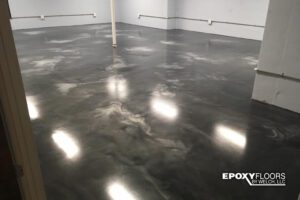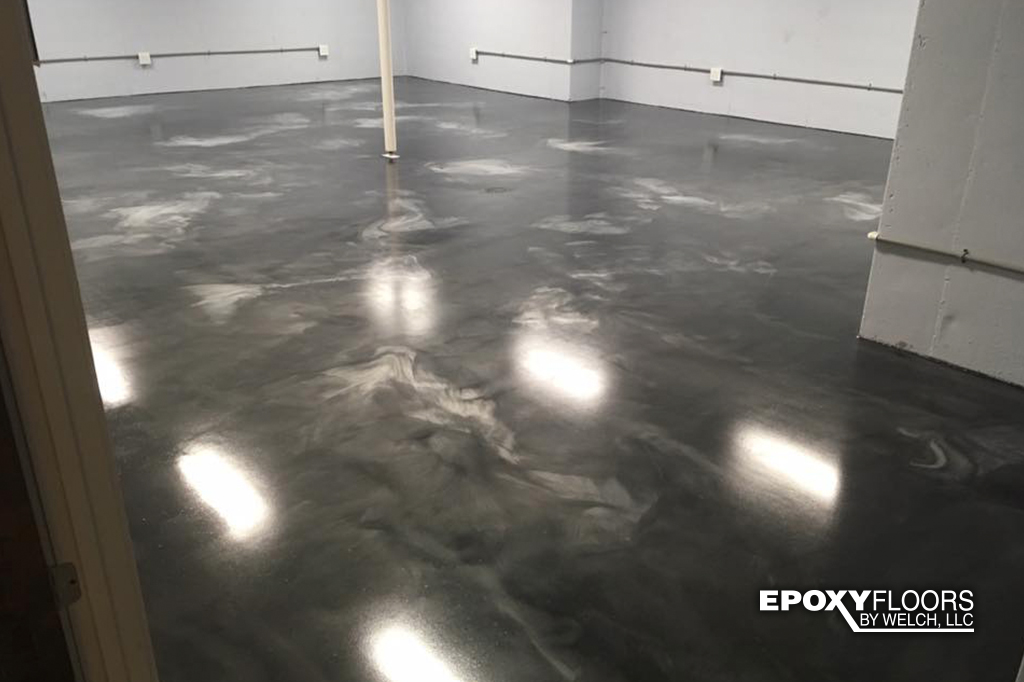When choosing a warehouse flooring option for your commercial spaces, you have many factors to consider, including the types of flooring and contractor for the project. Every facility has specific requirements for its flooring needs. While those factors vary from company to company, most commercial spaces require flooring that withstands high temperatures and surface impacts.
What Flooring Is Used in Warehouses?
High-quality flooring materials can make a difference in your warehouse. There are many options on the market. For many warehouses, epoxy and concrete flooring are popular choices. Epoxy and concrete materials provide good durability and add shine to the warehouse flooring. Many companies that handle food and beverages prefer epoxy concrete coating for their storage spaces. The flooring has the ultimate durability. Plus, this flooring is resistant to humidity, heat, chemicals, stains, and other environmental factors.
Along with warehouse epoxy flooring, there is polished concrete. This type of flooring will have a high-gloss finish. However, it is still a durable option. Polished concrete is an excellent choice for garages, showrooms, and warehouses. The surface of this flooring is polished for a stunning high gloss that will stand out in any environment.
Finally, an epoxy metallic flooring system is another excellent possibility for a warehouse. These floors are durable, long-lasting, and stain-proof. They are also available in various colors and design options.
What Is Commercial Flooring Called?
Commercial flooring covers a broad category and is used in several commercial settings, including offices, stores, healthcare facilities, and warehouses. While this flooring might seem similar to residential flooring, commercial flooring is designed to hold up to commercial use. In other words, it can withstand heavy wear and tear, like forklift usage or chemical spills. Commercial flooring is thicker and made with long-lasting materials.
Since there are many types of commercial flooring, these floors are called by several names. Epoxy and concrete flooring are the common options for these spaces. Some people refer to commercial flooring as warehouse epoxy flooring or polished concrete floors.
What Are Commercial Floors Made Of?
Depending on the type of flooring, the products used in the floors may vary. A commercial epoxy floor coating is usually a two-part mixture of hardeners and resin that protect the surface of the warehouse’s floors. The epoxy is rolled in multiple layers to create seamless flooring. A blend of water, cement, concrete, and other elements produces a durable polished concrete floor. Metallic epoxy uses a mixture of metallic powder and epoxy resin to give a glow to the flooring.
 What Is the Most Common Type of Commercial Flooring?
What Is the Most Common Type of Commercial Flooring?
Any durable flooring is an excellent option for a warehouse. However, many individuals choose either epoxy or concrete flooring for their facilities. A commercial epoxy floor coating is an exceptional choice. It can be easily applied to the surface to create a stunning appearance while protecting any warehouse floor. For those who want extra shine, metallic epoxy flooring will provide a little glimmer to your industrial spaces.
What Are the Benefits of Commercial Flooring?
When searching for warehouse flooring, choosing the right one for your needs is crucial. Epoxy flooring and other types of commercial options offer many benefits. These floors can help your facility increase safety and boost accessibility around the building. Commercial floors are slip-resistant and hold up to any type of environmental conditions.
Another significant advantage is the ease of maintenance for those floors. They can be swept with a mop or broom to keep their brilliant appearance. Commercial floors are known for their incredible strength. These floors resist stains, spills, and scratches, making them a great option for high-traffic spaces. Don’t forget about the aesthetic appeal of these floors. An epoxy floor coating can create the perfect look for your facility.
What Are Common Flooring Types for Warehouses?
Warehouse flooring needs to withstand all types of hazardous work. Over time, inferior floors can wear down or develop an abrasion on the surface. Those issues lead to unsafe conditions in your warehouse. Epoxy or concrete floors will give you the best durability to handle these harsh conditions. They are strong enough to hold machinery, such as a forklift. You can easily clean these floors if anything spills on the surface. Warehouses need a particular type of flooring for their needs. For many businesses, the common flooring types found in warehouses are epoxy or concrete floors.
What Material Is Best for Warehouse Flooring?
For many warehouse owners, the choice is clear. When you need a durable, long-lasting product, it is vital to make the right choice. Epoxy flooring is one of the top choices. You can easily install the coating over the floors in almost any facility. Plus, they look great for many years to come. For added appeal, consider metallic epoxy flooring that will take your flooring to the next level. Finally, concrete flooring doesn’t have to be boring. You can have it polished to create a high-quality, safe, and attractive option that will hold up to the harshest conditions.
Epoxy Floors by Welch, LLC is your top-tiered epoxy and metallic flooring source. Also, we are a concrete finishing company. Your satisfaction is our main priority. Schedule a consultation today!


